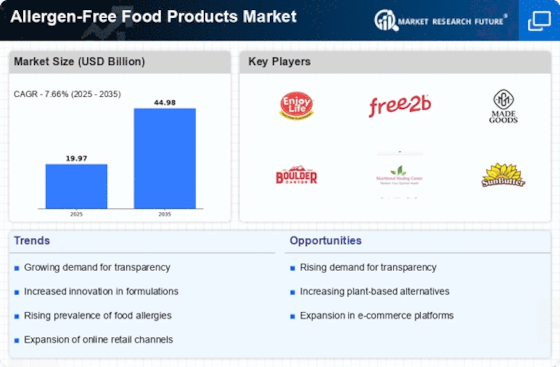Top Industry Leaders in the Allergen free food products market

The Allergen-Free Food Products market, a crucial sector within the food industry, has experienced notable growth due to the rising prevalence of food allergies and increased awareness of allergen-free options. This analysis provides an overview of the competitive landscape, highlighting key players, their strategies, factors influencing market share, emerging companies, industry news, current investment trends, and a significant development in 2023.
Key Players:
Danone SA (France),
General Mills (U.S.),
Abbott Laboratories (U.S.),
Nestle (Switzerland),
Kellogg Co. (U.S.),
Boulder Brands, Inc. (U.S.),
Kraft Heinz Company (U.S.),
Mead Johnson Nutrition Company (U.S.)
Strategies Adopted:
The Allergen-Free Food Products market employ a variety of strategies to enhance their competitive positions. Strategies include product diversification, acquisitions, strategic partnerships, and a focus on clean-label and natural ingredients. For instance, General Mills has strategically expanded its allergen-free product portfolio by acquiring innovative start-ups specializing in allergen-free snacks, aligning with the growing consumer demand for convenient and safe food options.
Market Share Analysis:
The Allergen-Free Food Products market involves evaluating factors that contribute to competitive advantages. Key considerations include product quality, safety certifications, marketing effectiveness, and responsiveness to evolving consumer preferences. Companies that successfully balance these factors are better positioned to capture and expand their market share. Additionally, factors such as supply chain efficiency, brand trust, and adherence to allergen-free standards play a crucial role in market differentiation.
News & Emerging Companies:
The Allergen-Free Food Products market has witnessed the emergence of new and innovative companies responding to the increasing demand for specialized allergen-free options. In 2023, companies like FreeBites entered the market, focusing on innovative allergen-free snacks with unique flavor profiles. These emerging players contribute to market diversity, fostering innovation and challenging established market dynamics.
Industry Trends:
The Allergen-Free Food Products market center around clean-label initiatives, sustainable packaging, and advanced manufacturing technologies. Key players are investing in research and development to introduce allergen-free products with natural and recognizable ingredients, meeting the growing consumer preference for transparency and clean-label options. Additionally, investments in sustainable packaging underscore the industry's commitment to addressing environmental concerns and aligning with eco-conscious consumer expectations.
Current investment trends highlight the importance of adapting to dietary preferences and addressing health-conscious consumer demands. Companies are investing in allergen-free products that not only meet safety standards but also align with broader wellness trends, such as gluten-free, non-GMO, and organic options. Furthermore, investments in digital marketing and e-commerce infrastructure reflect the industry's acknowledgment of the growing influence of online channels in consumer purchasing decisions.
Competitive Scenario:
The Allergen-Free Food Products market is characterized by a focus on safety, innovation, and transparency. Companies differentiate themselves through product quality, marketing effectiveness, and their ability to cater to diverse allergen-free needs. The market is influenced by factors such as adherence to safety standards, supply chain efficiency, and the ability to adapt to changing consumer perceptions and dietary preferences.
Recent Development
The Allergen-Free Food Products market in 2023 was Mondelez International's strategic partnership with a leading allergy research institute to enhance allergen detection and safety protocols. This collaboration aimed to strengthen Mondelez's commitment to providing safe allergen-free products by leveraging advanced testing methods and research insights. The partnership showcased the industry's recognition of the critical importance of investing in allergen detection technologies to meet the stringent safety expectations of consumers.
Mondelez International's strategic partnership underscored the broader trend of established companies actively seeking collaborations to reinforce their commitment to allergen-free safety and innovation. This move positioned Mondelez as a frontrunner in ensuring the highest standards of allergen safety and demonstrated the industry's dedication to continuous improvement and advancement in allergen-free food production.


